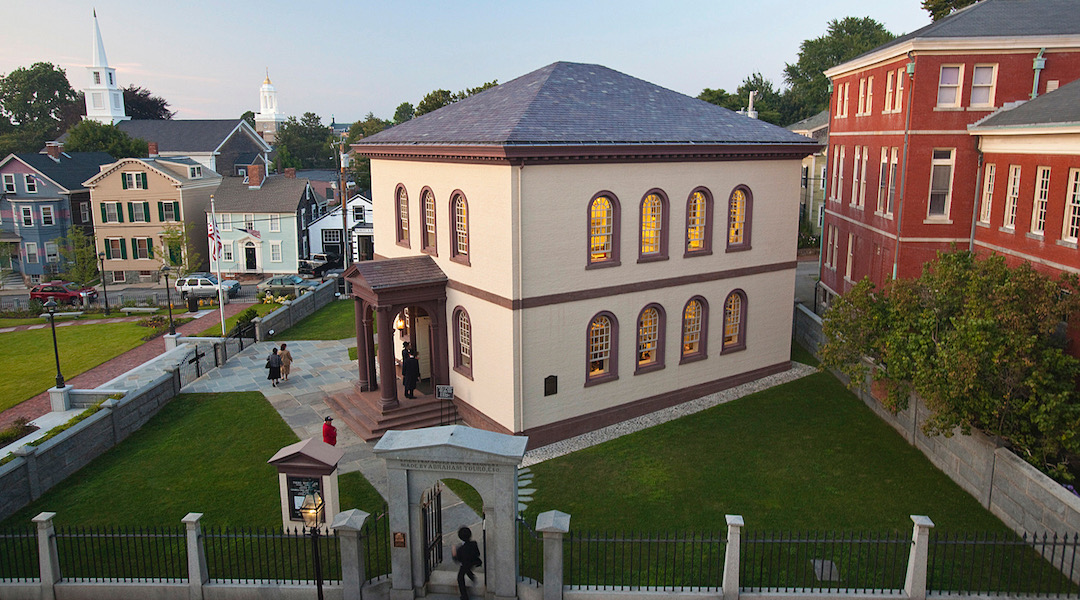NY congregation can evict tenants of historic Touro Synagogue, Rhode Island judge rules
The ruling is a major development in a legal saga that has stretched for more than a decade

Founders of the Touro Synagogue in Newport, Rhode Island, above included Sephardic Jewish families who belonged to New York’s Spanish and Portuguese Synagogue in the 1700s. (Congregation Jeshuat Israel, Touro Synagogue Foundation, George Washington Institute for Religious Freedom)
(JTA) — A Rhode Island judge has ruled in favor of a historic New York City synagogue that is seeking to remove the leadership of the congregation that meets at another historic synagogue building — Newport’s famed Touro Synagogue.
The ruling, issued Thursday, would evict the leadership of Congregation Jeshuat Israel, or CJI, which has been meeting at the Touro synagogue, America’s oldest, since the early 1900s.
Congregation Shearith Israel in New York City, also known as the Spanish and Portuguese Synagogue, owns the Touro building and has complained in recent years that CJI has failed to be a good steward of the site.
The two congregations have been in and out of court for at least a decade. CJI has been leasing the site for a symbolic $1 a year since the early 1900s. Shearith Israel, the nation’s oldest Jewish congregation — it was established in Manhattan in the 17th century and has occupied several different buildings since — refused in 2021 to renew CJI’s lease and ordered the congregation to vacate the premises by Feb. 21, 2023.
In June, the dispute reached the courtroom of Superior Court Judge Maureen Keough. In a lengthy decision read from the bench on Thursday, Keough said she could find no reason to rule in favor of the tenants but stayed the eviction until September. At that point, a hearing will take place to decide whether the congregation can remain in place while any appeals are underway, meaning that CJI is likely to remain in place at least through this year’s High Holidays, which begin on Sept. 15.
Louis Solomon, the parnas, or president, of Shearith Israel, welcomed the ruling.
“We’re committed to not only reviving the community but reviving the place Touro has in the hearts and minds of Jews all over America,” he told the Jewish Telegraphic Agency.
Michael Crane, an attorney for CJI, declined to comment. Louise M. Teitz, CJI’s co-president, did not respond to a request for comment.
The arrangement between the two Orthodox congregations has been tense for over a decade, and boiled over when CJI tried, in 2012, to sell a valuable set of Torah adornments from Touro’s inventory. In 2019, the U.S. Supreme Court effectively confirmed the New York synagogue’s ownership of the building and its pricey artifacts by declining to take up a challenge to its claims.
During the latest trial, Teitz noted the lengthy tenancy of CJI, saying its leadership had long maintained the integrity of the building and grounds, and had hired rabbis.
In turn, Shearith Israel has said that the congregation has not been forthright about the millions of dollars it would need to repair the building, which was built between 1759 and 1763. The New York synagogue also objected to decisions made by the CJI board, which included erecting a gravestone at Touro’s historic cemetery for a still-living donor without the New York synagogue’s knowledge.
Services at CJI are currently led by an interim rabbi, Stephen Belsky. According to Solomon, Shearith Israel has been in conversation with another congregation in Providence, Ahavas Israel, that is interested in holding services at Touro. Ahavas Israel was incorporated as a Rhode Island nonprofit corporation on April 4, 2023, and, according to a website called Jewish Newport, is not currently holding services.
The fight between the New York and Newport congregations stands in sharp contrast to the historical concord that the Touro Synagogue represents. After a visit to Newport in 1790, President George Washington wrote a letter to the congregation that is considered a landmark statement of religious freedom and tolerance.
In a previous statement to JTA, Teitz wrote on behalf of her board that she was “devastated that our Congregation has become the target of a shameful power grab by another Jewish congregation that over the years has not provided us or Touro any meaningful support at all. We condemn this destructive attack on our congregation and displacement of our community, and call upon Shearith Israel to let Jeshuat Israel live and pray in peace.”
In statements from the bench, Keough regretted that the two congregations had not solved their differences in mediation.
“If there was ever a case that cried out for mediation, based on what I’ve read it’s this one. It’s clear to me how passionate everyone is about this,” Keough said, according to the Providence Journal. Going to trial, she said, “should be a last resort. I’m sad we’ve gotten here.”
Solomon said Shearith Israel is excited about the future of Touro under a new board of overseers that it would appoint. He said current members of CJI would be welcome to join the congregation.
“We have 15 things that we want to program. We want to have scholars there. We want people to come up for the summers there,” he said. “I think it’s a time to heal and a time to grow.”
This article originally appeared on JTA.org.
A message from our CEO & publisher Rachel Fishman Feddersen
I hope you appreciated this article. Before you go, I’d like to ask you to please support the Forward’s award-winning, nonprofit journalism during this critical time.
We’ve set a goal to raise $260,000 by December 31. That’s an ambitious goal, but one that will give us the resources we need to invest in the high quality news, opinion, analysis and cultural coverage that isn’t available anywhere else.
If you feel inspired to make an impact, now is the time to give something back. Join us as a member at your most generous level.
— Rachel Fishman Feddersen, Publisher and CEO